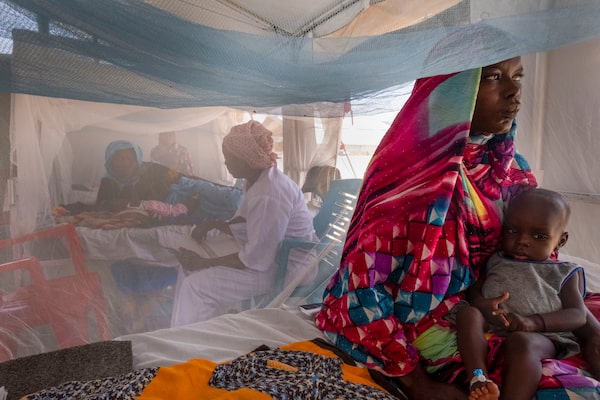
Sudanese Children suffering from malnutrition are treated at an MSF clinic in Metche Camp, Chad, near the Sudanese border, on April 6.Patricia Simon/The Associated Press
Sudan’s catastrophic military conflict is entering its second year on Monday, sparking a flurry of global attention and humanitarian funding promises, but there are few signs of progress in diplomatic efforts to halt the fighting that has forced nearly nine million people to flee their homes.
With mass famine looming and children starving, Sudan is now on the brink of collapse, relief agencies say. Already the world’s largest displacement crisis, it could soon become the world’s largest hunger crisis. Yet its war has been overshadowed by conflicts in Gaza and Ukraine, leaving Sudan struggling for help.
Protests and vigils in support of Sudan’s besieged people are planned in London, Washington and elsewhere around the world on Monday, the first anniversary of the eruption of war in Sudan, and in other cities this weekend.
Donor organizations and government leaders are meeting in Paris on Monday to pledge funds for a crisis that has left 25 million people – half the country’s population – in need of emergency aid. But the United Nations appeal for Sudan this year has reached less than 6 per cent of its US$2.7-billion goal so far, exposing the neglect that the country has suffered since the war began.
Canada’s International Development Minister, Ahmed Hussen, will attend the Paris conference. He announced on Friday that Canada will provide $100.7-million in humanitarian funding and $31.5-million in development assistance for Sudan and four neighbouring countries that are hosting Sudanese refugees.
Ottawa says all options on the table for solving Sudan’s humanitarian crisis
The United States had been seeking to organize talks between Sudan’s warring parties on April 18 in Saudi Arabia, but its diplomats acknowledged this week that they had failed to reach agreement on getting talks started on that day. Many ceasefire pledges in the past have been swiftly broken.
The one-year anniversary on Monday “marks a milestone of shame for the warring parties in Sudan, as much as for the international community that has allowed this catastrophe to worsen,” said Will Carter, the Norwegian Refugee Council’s country director for Sudan, in a statement this week.
“The looming famine should have forced warring parties to allow aid to flow, but the reality on the ground is that aid remains obstructed and global powers remain indifferent,” he said.
Many aid groups are finding it almost impossible to reach the worst-hit areas of the country, where 90 per cent of the neediest people are located, largely because of obstacles by the two warring sides: the Sudanese army and the paramilitary Rapid Support Forces.
One humanitarian agency, Islamic Relief, says it has been forced to move its Sudan headquarters several times over the past year as the violence has spread.
“Sudan is now one of the most dangerous and difficult places to deliver humanitarian aid, with dozens of aid workers killed, offices looted and regular bureaucratic obstruction,” the agency said in a statement on Friday.
“The economy is collapsing at a staggering rate,” it said. “Children are now dying of hunger and Islamic Relief staff are seeing a rapid increase in the number of malnourished children in the health and nutrition centres it supports, including some so emaciated they can barely breathe. Many families are eating just a few mouthfuls of sorghum a day.”
The agency estimated that five million people in Sudan are close to famine. Parts of the Darfur region in the west of the country, and the capital, Khartoum, are likely to suffer famine conditions within weeks, it said.
“Over the past year I’ve seen my country descend into violence, madness and destruction, neglected by the rest of the world,” said Elsadig Elnour, Islamic Relief’s Country Director in Sudan, in a statement.
“Everyone is traumatized. That’s how it feels to be Sudanese at this moment. We have lost loved ones, property, jobs, and the futures that we planned. Even the rich have become poor. Unless there’s a ceasefire and peace very soon, the country may collapse.”
The UN is warning of a generational catastrophe. An estimated 19 million children have been out of school for the past year, and nearly four million children are suffering acute malnutrition.
The health system, too, has largely collapsed. Only 20 to 30 per cent of the country’s hospitals and clinics are still functional, according to Médecins Sans Frontières. Over the past year, health facilities supported by MSF have treated more than 22,800 traumatic injuries from shrapnel, gunshots, blasts and other causes.
Nobody knows the death toll from the war, but it is massive. In a single city in Darfur last year, the Rapid Support Forces and its Arab militia allies killed between 10,000 and 15,000 people in ethnically targeted violence, a UN report said. Sexual violence, perpetrated by soldiers and paramilitary forces, is equally widespread.
Refugees continue to flee the country. An average of more than 1,800 people from Sudan are arriving in South Sudan daily, while others are crossing into Ethiopia, Chad, Egypt and the Central African Republic, according to the UN refugee agency UNHCR. Because of the Sudan war, Chad is experiencing the biggest influx of refugees in its history, with overcrowded camps and desperate conditions.